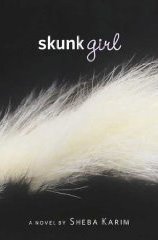 Sheba Karim was born and raised in Catskill, NY. She is a graduate of the New York University School of Law and the Iowa Writers Workshop. Her fiction has appeared or is forthcoming in 580 Split, Asia Literary Review, Barn Owl Review, DesiLit, EGO, Kartika Review, and Shenandoah. One of her short stories was recently nominated for a Pushcart Prize. Her young adult novel, Skunk Girl (ISBN: 978-0374370114), was published in 2009. She currently lives in New York City with her husband, and is the co-founder of a graduate school review site.
Sheba Karim was born and raised in Catskill, NY. She is a graduate of the New York University School of Law and the Iowa Writers Workshop. Her fiction has appeared or is forthcoming in 580 Split, Asia Literary Review, Barn Owl Review, DesiLit, EGO, Kartika Review, and Shenandoah. One of her short stories was recently nominated for a Pushcart Prize. Her young adult novel, Skunk Girl (ISBN: 978-0374370114), was published in 2009. She currently lives in New York City with her husband, and is the co-founder of a graduate school review site.
1. There has been a rising interest in Pakistani Writing in English (PWE) lately? What is the focus and strength of your writing?
There definitely has been a lot more interest in Pakistani writing in English in recent years, which is probably due to there being more Pakistani writing than ever before. The rising global interest in Pakistan may also play a role in the fact that more books about Pakistan/Pakistanis are being published. My main focus has been writing about Pakistanis living in the United States. I think it is often a strength to write about something which you’ve experienced yourself, something about which both your mind and your heart can speak to, but I also think it’s nice to sometimes step away from the very familiar, so my current project has nothing to do with Pakistanis in the States.
2. Tell us about your experience as a Pakistani-American in the United States? How did you find your voice as a writer? What compelled you to write for the young adult market?
I was raised in a small town with very few other desis, a setting similar to the one in Skunk Girl. Being Pakistani made me separate, different, and often annoyed, because of the restrictions placed on me as a teenager. I think your culture is often something you grow into. I also think as wonderful as being a “hyphen” is, it can also be very difficult, particularly for women from Muslim backgrounds. Things are different now than when I grew up. In those days, people didn’t pay too much attention to Islam and Pakistan, but the generation growing up post 9/11 has had to deal with an often hostile public perception and a lot of negative media. Often, if you are being attacked, it brings you closer to your religion and your culture.
In terms to writing, I started writing at a young age, but stopped when I left for college. I became a lawyer and realized that I was unhappy, that I had always wanted to be a writer and if I didn’t at least try I’d forever regret it, so I began writing again. Skunk Girl was inspired by a monologue I wrote for Yoni ki Baat, a South Asian version of The Vagina Monologues. I realized there were very few books out there about what it’s like to grow up Pakistani in this country, and that I really wanted to write one.
 3. How was the path to publishing for you? Can you give the readers a brief overview of your journey?
3. How was the path to publishing for you? Can you give the readers a brief overview of your journey?
As I mentioned before, I began writing again when I started practicing law. I took classes at night and applied for MFA writing programs two years later. I was accepted by the Iowa Writers Workshop and was able to pursue writing there full time. Literary agents often visit Iowa to meet with the students, and that’s how I met my agent, Ayesha Pande. I showed her some of Skunk Girl and she was very excited about it and encouraged me to keep at it, which of course I did.
4. How do you think the young readers would relate to the character of Nina Khan in Skunk Girl? The reviews have been great but in your opinion, what make her so unforgettable?
What I love most about Nina is her sense of humor. No matter how awful or unattractive or pitiful she feels, she is always able to laugh about it. I think the ability to laugh at yourself is often what gets you through.
5. Would you continue to write for the young adult market or you would like to venture in other areas in the future? What are you future plans?
It would be great to write more young adult in the future, but right now I’m working on a historical fiction novel set in medieval India, something very different than Skunk Girl!





Another nice addition to Pakistani literature.
Zohra